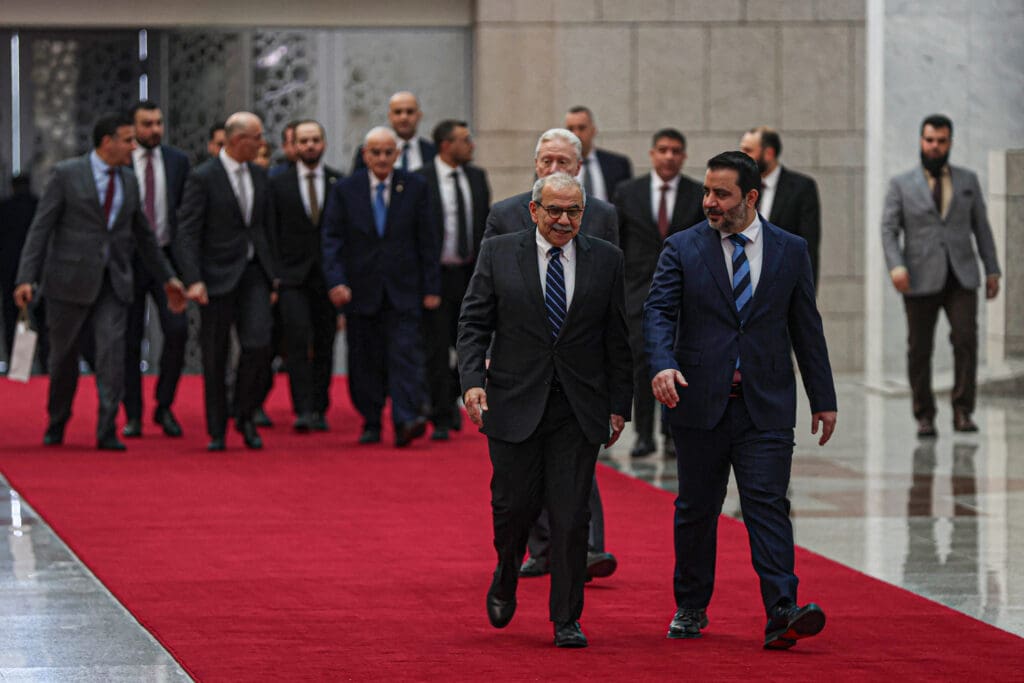Post-Assad Syria is searching for its place in Lebanon. Since assuming the presidency in January, President Ahmed al-Sharaa has been keen to emphasize that the Syria of today differs from the one under the Assad regime, which managed affairs in Lebanon for decades through security agencies and local allies. The new administration is seeking to build fresh legitimacy, restore its regional and international relations, and shed the legacy of its long-standing alliances with Iran and Russia.
However, the relationship between Damascus and Beirut remains burdened by a history of mutual suspicion. While the Lebanese are wary of quiet Syrian attempt to restore its dominance, officials in Damascus believe that the Lebanese do not appreciate the fundamental change happening in their country. Damascus has openly expressed its dissatisfaction at Beirut’s foot-dragging in opening official channels for cooperation, as reflected in President Joseph Aoun’s failure to make an official visit to the Syrian capital, and is not engaging on key issues of mutual interest including prisoners, borders and the status of Hezbollah. Indeed, these problems have become intractable because of both sides’ messy internal politics and the external pressures they face. To break the deadlock and move forward together in a new direction, Lebanon and Syria must unify their respective polities and set a clear vision that allows them to put their shared past behind them.
A Thorny History
The Lebanese-Syrian relationship has never been normal, characterized by two neighboring countries united by geography and divided by politics. Since the time of their independences, their relationship has remained unequal, with Syria viewing Lebanon as a geographical extension of its own territory—and national security—rather than an independent, sovereign state.
Under Hafez al-Assad’s nearly three-decade rule that began in 1971, the relationship entrenched into one of direct tutelage. After the Lebanese civil war ended with the 1989 Taif Agreement, Syria was granted a central role in maintaining security in Lebanon, giving legitimacy to its military and intelligence presence there. Its clout grew further after Syria joined the international coalition to liberate Kuwait in 1990 in exchange for an implicit international green light to consolidate its hegemony over Lebanon. This understanding continued up until the assassination of Lebanese Prime Minister Rafik al-Hariri in 2005, which marked the beginning of the end of Syria’s direct presence in the country.
Still, Syria’s attitude toward its neighbor continued in much the same vein under Bashar al-Assad, albeit adapted to new regional realities, until the outbreak of the Syrian revolution in 2011 changed the equation. Now, with the unexpected fall of the regime in December and the rise of a new leadership headed by Sharaa, the nature of Syria’s relations with Lebanon has reopened for consideration.
Issues of Discord
In the eyes of Damascus, one of the most prominent contemporary challenges in relations between the two countries is the issue of Syrian detainees in Lebanese prisons. According to official Syrian sources, their number exceeds 2,000, including some convicted of felonies, others charged on “terrorism” offenses, and those that the Lebanese courts have yet to convict of any crime. Their fate is a complex question, one that the Lebanese authorities treat as both a security and judicial issue, while Damascus considers it a sovereign, humanitarian issue and a test of Beirut’s position toward the new Syrian government.
Sharaa has announced an urgent diplomatic mission expected to focus on the prisoners, emphasizing the need to establish a legal mechanism for the release of the hundreds of detainees not convicted of crimes, or their extradition to Syria for trial. Syria’s leadership has hinted at escalatory steps if Lebanon fails to respond, including suspending aspects of bilateral, economic and security cooperation, and imposing restrictions on the movement of goods.
Another point of contention is the question of their shared border. The process of demarcating land borders has never been completed, while there is no clear agreement on their maritime border, either, opening the possibility of future disputes over subsea gas and oil resources. Damascus is conditioning progress on borders on Lebanon making its position clear on political relations between the two sides. Beirut, on the other hand, prefers to limit demarcation to a purely technical framework to avoid its politicization, especially given the fragility of domestic decision-making and pressure from Lebanese factions who fear offering any strategic gains to Damascus.
In this context, Saudi Arabia hosted a meeting in late March between the Lebanese and Syrian defense ministers, presenting itself as the Arab guarantor in a pragmatic de-escalation process ahead of any comprehensive political normalization. U.S. envoy Thomas Barrack also addressed the issue of demarcation in his political proposal for Lebanon, emphasizing the need to control crossings, impose a state monopoly on arms and demarcate the border with Syria as a condition for strengthening Lebanese sovereignty and confronting foreign influence.
Perhaps the stickiest issue on the agenda is the status of Hezbollah, which has played a large role in both countries in recent years. Ironically, calls for a Lebanese state monopoly on arms are no longer coming only from the Israeli, Western and Gulf capitals, but also from the new rulers in Damascus, whose stance on Hezbollah differs markedly from that of the Assads. Just as Washington, Paris and Riyadh are demanding that the Lebanese state develop a plan to confiscate Hezbollah weapons, particularly south of the Litani River, Damascus is expressing concern about Hezbollah deployments in the Bekaa Valley and the build up of a missile arsenal, which now constitutes a potential threat to Syria’s security.
The Syrian leadership fears that Hezbollah could use its presence in the Bekaa to mobilize cells within Syria, particularly in border areas with mixed tribal loyalties and among remnants of the former regime. This concern is greater given the possibility that Hezbollah could use its supply lines in the Bekaa to rebuild its influence inside the country, amid growing U.S. and Israeli pressure on the group in Lebanon.
This shift in Syria’s position was highlighted Barrack’s recent visit to Beirut and Damascus, where he voiced Washington’s appreciation for the Syrian administration’s efforts to impose sovereignty and a monopoly on arms, calling on Lebanon to follow this example. Speaking from Beirut, he also emphasized that demarcating the border with Syria, including the status of the Shebaa Farms, was no longer an option but a necessity. This convergence between Washington and Damascus over Hezbollah’s arsenal, despite their differences, could present Lebanon with an unprecedented situation: Hezbollah’s weapons have become a source of concern for allies and adversaries alike, making the situation very uncomfortable politically for the new government in Beirut and leaving little room for manuever.
The Need for a Bold Policy
Lebanon finds itself in a complex position, between Syrian pressure, cautious American support, and Arab efforts to contain tensions and resolve issues. Moreover, the absence of an independent national decision-making process and clear national vision weakens Lebanon’s negotiating position, renders its relationship with Syria reactive rather than proactive, and revives fears of a recurrence of past experiences—most notably those of the 1990s, when the regional and international balance of power conspired to consolidate Syrian hegemony over Lebanon.
This persistent stalemate raises three possible scenarios for the future of Lebanese-Syrian relations. First: The two sides reach a conditional understanding based on Beirut’s compliance with Syrian demands—particularly regarding Syrian detainees in Lebanon—in exchange for gradual Syrian steps toward openness, including reactivating economic and border cooperation under Arab supervision. Second: Relations cool even further and there is a freeze on official cooperation, the imposition of Syrian restrictions on trade and border crossings, a possibility of popular protests on the border, and each side using the question of Hezbollah to apply pressure on the other. Third: A re-establishment of a regional and international understanding encompassing Lebanon, Syria, and perhaps even Israel, occurs under American auspices. Such an understanding could lead to a redistribution of influence, as happened after the Taif Agreement, but within a new map of the Middle East.
Moving Forward
Lebanon and Syria cannot continue to turn their backs on each other or deal with the radical transformation in Damascus as if nothing has changed. A lack of initiative and the persistence of domestic divisions in Lebanon will only lead to further unrest, likely transforming external pressures—particularly from Israel—into direct threats to the state and its institutions. Political pragmatism demands that Beirut develop a strategic approach toward Damascus based on the new political reality there, and prioritizing the interests of the Lebanese state through a roadmap based on sovereignty, coordination and balance. Instead of remaining an arena for settling scores, Lebanon could transform into center of regional dialogue, providing it has the courage to take the initiative, negotiate with its neighbors as a full partner, and not merely as a sphere of influence. In return, the Lebanese should expect Syria to play a positive role based on respect for Lebanon’s sovereignty and equal partnership, and to adopt a step-by-step approach to overcome the legacy of tutelage and conflict and open a new chapter of normal, equitable relations between the two countries.


